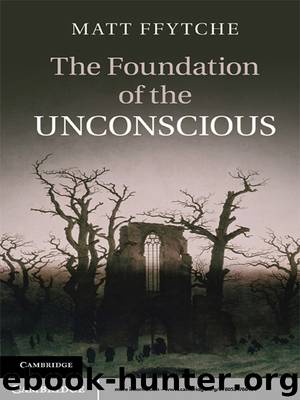Foundation of the Unconscious by Ffytche Matt;

Author:Ffytche, Matt;
Language: eng
Format: epub
Publisher: Cambridge University Press
Published: 2012-03-08T16:00:00+00:00
The fires of transfiguration
I have traced Schelling’s elaboration of the philosophical structure of the unconscious through three separate regions in the Romantic human sciences. First of all, there was his attempt to surmise a lost science stemming from a buried epoch of history; secondly, the religious ontology of a divine abyss, newly recovered by work on German medieval spiritual traditions; thirdly, a theory of historical repression developed as part of his theory of myth. The fourth facet of the unconscious I want to trace involves yet another way of construing the self’s aporetic foundation, this time implicating not the lost, the mystical or the uncanny, but much subtler gaps emerging in Romantic descriptions of natural and historical process. I have concentrated so far on the topological configuration whereby the unconscious is that portion of reality which is structurally excluded from presence – that which takes place in the abyss, or is repressed as the past. But for all its displacement, Schelling also hesitantly theorises an active role for the absolute, just as Freud and Jung later will for the unconscious. It is a hidden organism, but it still controls and determines ‘each deed rich in consequence … to the day, the hour’, and as such it can be identified with obscure processes of development in existence itself, with thresholds and transitions in nature and history, from lower into higher states, and from latency to futurity.96 In this active mode, the absolute is not completely withdrawn. Rather, it is the divine operating in mysteriously clandestine ways within the material and organic world – what Schelling sometimes refers to quasi-alchemically as ‘the flash of light concealed in the hard stone’.97
This dynamic facet of the absolute runs back to some of the earliest ideas in the Naturphilosophie, but it is not those older systems of nature which concern us here so much as the way in which certain of their descriptive figures of latency, futurity and emergence were taken up as important metaphors within a wider Romantic science of life. In 1827, for instance, at the same time as Schelling was delivering his revised ‘System of the Ages of the World’ in Munich, Friedrich Schlegel gave a series of lectures on the ‘Philosophy of Life’ in Vienna, in which he suggested that ‘in the natural world every object consists of living forces, and … properly nothing is rigid and dead, but all replete with hidden [verbognem] life … Beneath the vast tombstone of the visible world there slumbers a soul, not wholly alien, but more than half akin to our own.’98
Hiddenness is here a condition not just of the past, but of life in general, and it mediates the emergence of futurity in life. Thus Schelling, Schlegel, Schubert, Baader and others attach the unconscious to manifestations of identity which exceed objective presence but continually forge their way through it, mysteriously transfiguring and developing it. The unconscious grounds what is essentially an alternative Romantic account of objectivity – one which subverts the philosophy of mechanism with concepts of life, change and self-creation.
Download
This site does not store any files on its server. We only index and link to content provided by other sites. Please contact the content providers to delete copyright contents if any and email us, we'll remove relevant links or contents immediately.
The Art of Thinking Clearly by Rolf Dobelli(8836)
The 5 Love Languages: The Secret to Love That Lasts by Gary Chapman(8481)
Mindhunter: Inside the FBI's Elite Serial Crime Unit by John E. Douglas & Mark Olshaker(7827)
Becoming Supernatural by Dr. Joe Dispenza(7099)
Nudge - Improving Decisions about Health, Wealth, and Happiness by Thaler Sunstein(6629)
The Road Less Traveled by M. Scott Peck(6627)
Enlightenment Now: The Case for Reason, Science, Humanism, and Progress by Steven Pinker(6403)
Win Bigly by Scott Adams(6306)
Mastermind: How to Think Like Sherlock Holmes by Maria Konnikova(6225)
The Way of Zen by Alan W. Watts(5790)
Factfulness: Ten Reasons We're Wrong About the World – and Why Things Are Better Than You Think by Hans Rosling(4015)
The State of Affairs by Esther Perel(3919)
Gerald's Game by Stephen King(3913)
Man's Search for Meaning by Viktor Frankl(3622)
The Confidence Code by Katty Kay(3561)
Thinking in Bets by Annie Duke(3527)
The Worm at the Core by Sheldon Solomon(2910)
Enlightenment Now by Steven Pinker(2910)
Liar's Poker by Michael Lewis(2805)
